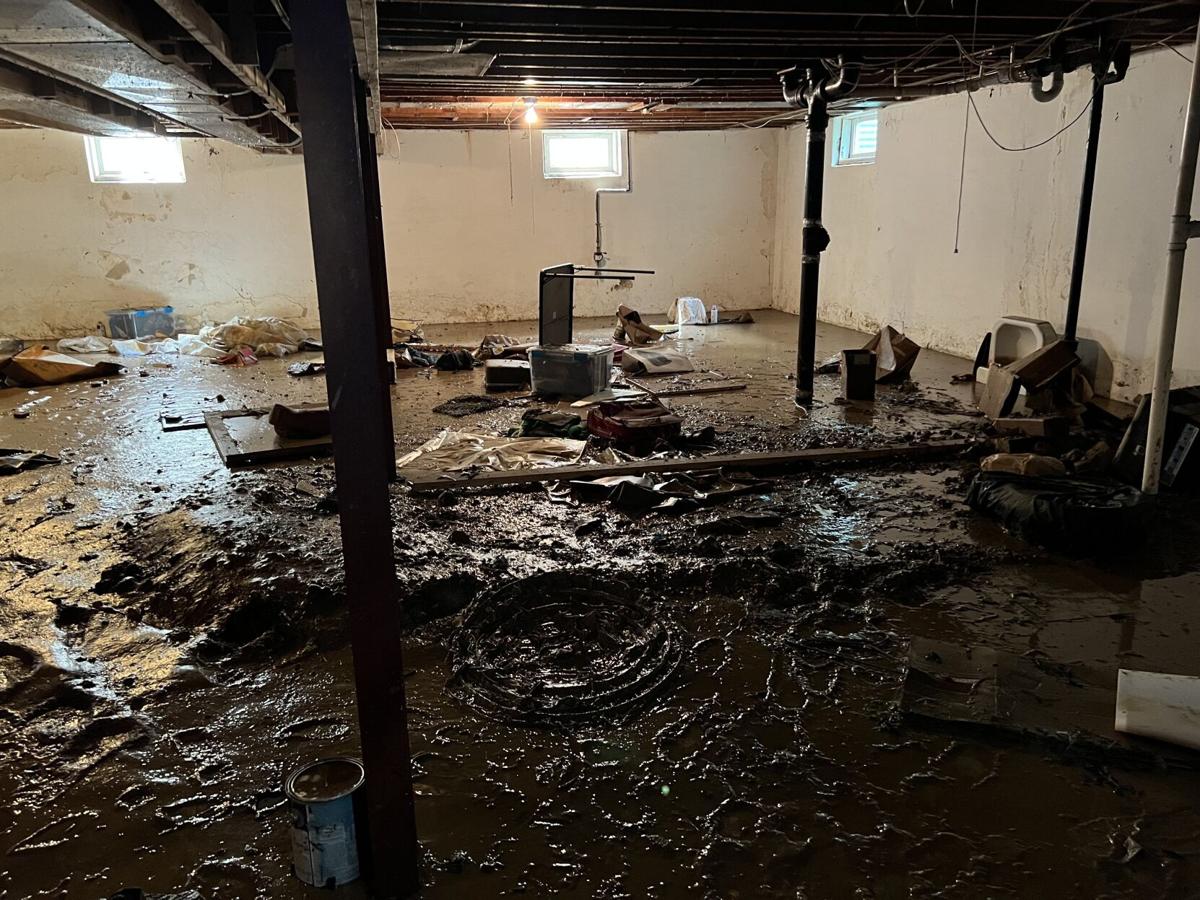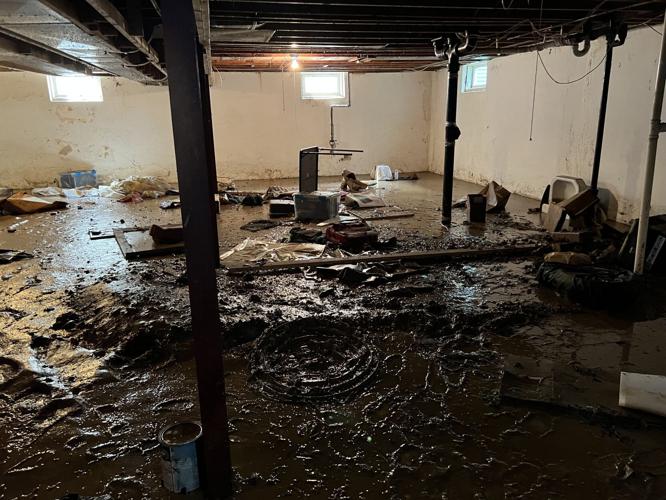UNIVERSITY CITY ŌĆö Ellyssia Rogers decided to move back to the ├█č┐┤½├Į area in 2020. She found a 3-bed, 3-bath ranch on Groby Road for $210,000, across the street from the River Des Peres.
She closed on the house in March that year. In August, her basement flooded.
Neighbors warned her: ŌĆ£ŌĆśThat house floods all the time,ŌĆÖŌĆØ she remembers them saying after she moved in.┬ĀŌĆ£And that was the first time I heard it. I said, ŌĆśAre we talking about the same house?ŌĆÖŌĆØ
ŌĆ£I just started getting a sinking feeling, like, ŌĆśOh, my goodness. I think IŌĆÖve been duped,ŌĆÖŌĆØ she said.┬Ā
Then, three summers ago, a record-shattering rainstorm filled her basement ŌĆö and her ground floor. And that was it. Rogers knew she couldn't stay.
States across the country are forcing home sellers to disclose when their homes have flooded. But not in Missouri. Here, where homes are flooding and flipping by the dozens, there's nothing in state law that specifically requires sellers to disclose past floods. And experts say homeowners should only expect more floods to come.
People are also reading…
ŌĆ£ThereŌĆÖs definitely a trend toward disclosure that weŌĆÖve seen in the last five or six years,ŌĆØ said┬ĀJoel Scata, an attorney for the Natural Resources Defense Council who focuses on climate change impacts, such as flooding and extreme weather events. ŌĆ£I think thereŌĆÖs a recognition that flooding is just becoming more severe.ŌĆØ
And with that, he added, is a recognition that peopleŌĆÖs biggest investments ŌĆö their homes ŌĆö are at risk, upping the chances for financial suffering. On average, just an inch of floodwater can cause $25,000 in damages to a home, Scata said.
Missouri, however, is one of 14 states to receive an ŌĆ£FŌĆØ grade on the annual ŌĆ£Flood Risk Disclosure Laws ScorecardŌĆØ from the NRDC.
Missouri requires home sellers to disclose problems with the home being sold. But the disclosure forms rely on the sellerŌĆÖs honesty,┬Āexperts say. And one of a buyer's only recourses, after purchase, is to file suit against the seller, which is expensive and laborious, the experts say. That all puts the onus of uncovering a house's past on the buyer.
Some, like Rogers, are frustrated that Missouri homebuyers can be left in the dark.
"I just can't believe there aren't any guardrails or something to make sure that prospective buyers are aware of the flood history," she said.
Two months after the 2022 flood, Rogers sold the house for $30,000 to a franchise of HomeVestors of America, a Dallas-based┬Ācompany with franchises that buy and sell ŌĆ£ugly houses,ŌĆØ and that often target desperate homeowners after natural disasters.
ŌĆ£I hated to sell my house,ŌĆØ Rogers said. ŌĆ£I just felt like that was my only option.ŌĆØ
Months later, the home had new paint, new flooring, new appliances, a sump pump in the basement and was back on the market.

A real estate website shows the revamped house at 1095 Groby Road in University City, which was purchased by investors after it was flooded in 2022, then fixed and resold.
Dozens of homes flooded, sold
In July 2022, ├█č┐┤½├Į was drenched with just over 9 inches of rain in a 15-hour span, including almost 8 inches in a six-hour burst.┬ĀMore than 220 homes across the metro area were declared condemned, nearly all of them in hard-hit University City.
It's left many homeowners forced to choose: Repair and brace for the next flood as the warming climate produces heavier, more frequent major downpours. Or sell.
A Post-Dispatch examination of sales and home ownership data shows that the cycle reflected by RogersŌĆÖ home on Groby Road┬ĀŌĆö flood, condemn, sell ŌĆö was not unusual: In ├█č┐┤½├Į County, at least 56 homes that were condemned after flooding that summer have since been sold.
At least 13 sold multiple times.
In fact, according to the analysis, the condemned houses were more than twice as likely to sell than other homes in the region.
And almost one-third of those homes are now owned by limited liability companies ŌĆö double the number prior to the flood. In some cases, the properties have been purchased by out-of-state entities from across the country.
In University City, entire streets flooded in some neighborhoods.
Rogers' old neighborhood, for instance, is a quiet few blocks of small brick houses and big trees. But it's just downstream from the sprawling parking lots of Olive Boulevard and just feet from the River Des Peres itself. Here, dozens of homes flooded. Some remain empty, with faded bits of condemnation signage lingering on doorways. Others have boomeranged back from blight and vacancy.
Almost two miles downstream, on Vernon and Dartmouth avenues, another several dozen houses flooded.┬Ā┬Ā
A few residents in those neighborhoods said they were from the area and knew it flooded, or were told by their real estate agents. Others said they had no idea it flooded so much, or didnŌĆÖt learn about it until they bought their homes and were shopping for insurance.
Many said they were renters ŌĆö and there are no requirements in Missouri for them to be told of their dwellingŌĆÖs flood history ŌĆö who said they didn't know, were too new to the area to know, didn't appear to understand the question, or didn't want to talk about it.
Many said they didn't speak English.
Only on a few rare occasions did residents say they had clear knowledge of their homeŌĆÖs flood history before moving in.
Buyer beware
In Missouri, experts say there are very few things that must be disclosed about properties for sale. Lead is one exception, thanks to federal policy. And the state requires that both property sellers and landlords disclose if a property ŌĆ£is or was used as a site for methamphetamine production.ŌĆØ
Otherwise, state law also obligates real estate agents to disclose ŌĆ£adverse material facts actually known or that should have been known.ŌĆØ But it states that sellersŌĆÖ or landlordsŌĆÖ agents donŌĆÖt need to conduct their own independent investigation of a given property nor ŌĆ£verify the accuracy or completeness of any statementŌĆØ made by a client or inspector.
ŌĆ£We donŌĆÖt have to do deep digging,ŌĆØ said Tina Siebert, a local real estate agent with Redkey Realty Leaders. ŌĆ£But if we know about it, we need to share that information.ŌĆØ
Sometimes sellers┬Ātruly donŌĆÖt know the nuances of a homeŌĆÖs history┬ĀŌĆö when, for instance, it belonged to a relative or is an investment property they havenŌĆÖt lived in┬ĀŌĆö which could make it hard to have a ŌĆ£hard and fastŌĆØ disclosure rule, she said.
Siebert said that she strongly encourages sellers to disclose as much information as they know. In cases when information is lacking, she said buyers can back out of a contract if they learn a property is in a 100-year floodplain, even after making an offer.
In practice, though, the homeowners┬ĀŌĆö not the real estate agents┬ĀŌĆö are ultimately the ones who fill out disclosure forms for a house thatŌĆÖs on the market, said Joe Hostman, a local real estate agent for Re/Max Results. While agents must then answer truthfully if asked about certain problems, homeowners are financially ŌĆ£kind of incentivized not to tell the truth,ŌĆØ he said.
ŌĆ£ItŌĆÖs exceptionally backwards,ŌĆØ Hostman said. ŌĆ£ItŌĆÖs really a loose system that just relies on the seller being a good person.ŌĆØ
Disclosure forms often don't provide much information on flooding at all, he said. When they do, he recommends taking it with┬ĀŌĆ£an extreme grain of salt.ŌĆØ
Moreover, he said, defining terms in such disclosures can be difficult.┬ĀŌĆ£Like, is two inches of water a flood? ... Is a broken water pipe a flood?ŌĆØ
Hostman suggests asking home sellers for insurance claims, if possible.
He also suggests a thorough examination of a home's basement and foundation ŌĆö fueling his distrust in finished basements.
ŌĆ£They hide everything important,ŌĆØ he said. ŌĆ£You do not know whatŌĆÖs going on behind that wall.ŌĆØ
Flash flooding from Coldwater Creek goes into the Hazelwood home of Jean and Rick Guinn on July 26, 2022; while backed-up sewage and River Des Peres water enters Mary Ann Gaston's basement in University City.
Lessons from flood victims
According to county records, RogersŌĆÖ old house on Groby sold four times after the flood. Three of those sales went to LLCs. The last went to the current homeowner, for about $263,000.
Matthew Becker, the owner and broker at Magnolia Real Estate, said he handled the most recent sale, from what he said was an investment firm to the homeowner.
He said the seller ŌĆ£disclosed upfront that there had been a water issue in July of 2022,ŌĆØ and that the property was in a floodplain.
ŌĆ£We always tell them, ŌĆśDisclose, disclose, disclose,ŌĆÖŌĆØ Becker said, describing Magnolia's advice to sellers.
Neither HomeVestors nor the homeŌĆÖs current owner responded to requests for comment.
Rogers now lives in Ballwin, in a home away from high-risk flood zones. ŌĆ£I just decided not to be anywhere near a floodplain if I could help it,ŌĆØ she said.
Other local flood victims have taken similar, hard-earned lessons to heart in their searches for new homes.
Hannah Briick lives on Wilson Avenue in University City, where two residents died in flooding in 2008, and where flood-prone homes along one entire side of the street were later bought out┬Āand replaced by a grassy park.
The home owned by Briick and her husband flooded in 2022, days before they were set to close on selling it.
Now they feel trapped. They want to sell their home, but not for cheap. They hope they might, too, land a buyout.
But when the couple sees listings for different homes that feature plenty of upgrades, especially for basement appliances like new water heaters, they see them as warning signs.
ŌĆ£WeŌĆÖre like, ŌĆśNope!,ŌĆÖŌĆØ she said. ŌĆ£ŌĆśWe know what youŌĆÖre hiding. We know why that was replaced.ŌĆÖŌĆØ
They also do their own sleuthing with the naked eye, looking carefully for signs of water damage when they visit a home thatŌĆÖs for sale.
ŌĆ£ItŌĆÖs a lot of effort,ŌĆØ Briick said.┬Ā




















